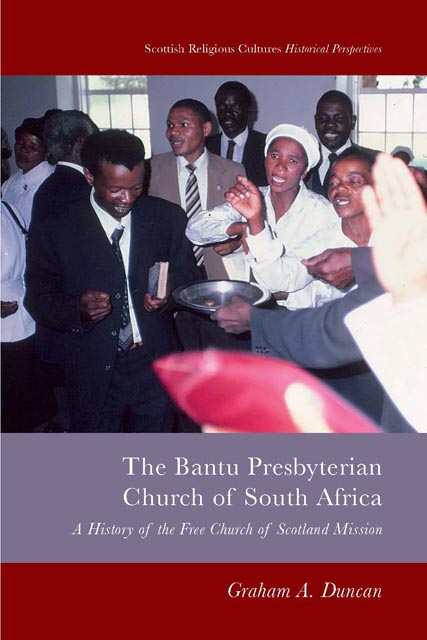Book contents
- Frontmatter
- Contents
- Acknowledgements
- Timeline
- A Presbyterian Anthem
- Introduction
- 1 Background to this Study
- 2 The Origins and Early Development of Scottish Presbyterian Mission in South Africa, 1824–65
- 3 Rev. Tiyo Soga (1829–71): A Paragon of Early Indigenous Leadership
- 4 The Role of Mission Councils in the Scottish Mission in South Africa, 1864–1923
- 5 The Rev. Edward Tsewu’s Dispute with the Free Church of Scotland Mission
- 6 The Mzimba Secession, 1898: A South African ‘Disruption’
- 7 Presbyterianism in South Africa, 1897–1923: To Unite orNot to Unite?
- 8 Preparations for the Formation of the Bantu Presbyterian Church of South Africa, 1897–1919
- 9 The Formation of the Bantu Presbyterian Church of South Africa, 1920–3
- 10 Mission to Church – Church to Mission: The First Ten Years, 1923–33
- 11 Reaching Out: The Bantu Presbyterian Church in South Africa and the Presbyterian Church of South Africa and Ecumenism, 1923–39
- 12 The Bantu Presbyterian Church in South Africa and Ecumenism, 1940–99
- 13 The End of Mission Councils: The Church of Scotland South Africa Joint Council, 1971–81
- 14 A Young Church in Mission or Maintenance Mode?: The Bantu Presbyterian Church of South Africa, 1923–99
- 15 The Bantu/Reformed Presbyterian Church and Socio-political Issues
- 16 Bantu/Reformed Presbyterian ChurchWomen in Leadership in Ministry
- Conclusion: Indigenous Presbyterians and Missionaries –Transferring Contending Roles and Responsibilities
- Bibliography
- Index
3 - Rev. Tiyo Soga (1829–71): A Paragon of Early Indigenous Leadership
Published online by Cambridge University Press: 26 November 2022
- Frontmatter
- Contents
- Acknowledgements
- Timeline
- A Presbyterian Anthem
- Introduction
- 1 Background to this Study
- 2 The Origins and Early Development of Scottish Presbyterian Mission in South Africa, 1824–65
- 3 Rev. Tiyo Soga (1829–71): A Paragon of Early Indigenous Leadership
- 4 The Role of Mission Councils in the Scottish Mission in South Africa, 1864–1923
- 5 The Rev. Edward Tsewu’s Dispute with the Free Church of Scotland Mission
- 6 The Mzimba Secession, 1898: A South African ‘Disruption’
- 7 Presbyterianism in South Africa, 1897–1923: To Unite orNot to Unite?
- 8 Preparations for the Formation of the Bantu Presbyterian Church of South Africa, 1897–1919
- 9 The Formation of the Bantu Presbyterian Church of South Africa, 1920–3
- 10 Mission to Church – Church to Mission: The First Ten Years, 1923–33
- 11 Reaching Out: The Bantu Presbyterian Church in South Africa and the Presbyterian Church of South Africa and Ecumenism, 1923–39
- 12 The Bantu Presbyterian Church in South Africa and Ecumenism, 1940–99
- 13 The End of Mission Councils: The Church of Scotland South Africa Joint Council, 1971–81
- 14 A Young Church in Mission or Maintenance Mode?: The Bantu Presbyterian Church of South Africa, 1923–99
- 15 The Bantu/Reformed Presbyterian Church and Socio-political Issues
- 16 Bantu/Reformed Presbyterian ChurchWomen in Leadership in Ministry
- Conclusion: Indigenous Presbyterians and Missionaries –Transferring Contending Roles and Responsibilities
- Bibliography
- Index
Summary
Introduction
The narrative of the early Presbyterian mission in South Africa is not just the story of the activities of Scottish missionaries. Nor is it the story of anonymous black South Africans who played a supporting role in the advance of the mission. There were many exceptional characters as we have seen in the mission to Nyasaland. We turn our attention on one remarkable black South African missionary – Rev. Tiyo Soga.
Tiyo Soga was to be the most famous of all Xhosa converts … He was to be the first black ordained minister to be educated overseas, the first black missionary among his own people, and the first translator of an English classic (Pilgrim's Progress). (Mostert 1992: 1023)
The name of Tiyo Soga stands out in the mission history of the Eastern Cape province of South Africa. Born a son of the soil and raised in the traditional faith and practice of his people, he became an outstanding example of the transformation/conversion of an African as one who: ‘had pride in his church, his race, and in the history and culture of his people’ (Switzer 1993: 162).
We may consider Tiyo Soga to be a paradox to better understand him. Otherwise, it would be necessary to conclude that he was a contradiction in terms – neither black not white, neither African nor European, neither a slave nor a master, neither arrogant nor humble, neither British nationalist nor African nationalist, neither an admirer of the British way of life nor a despiser of his own African culture. He stood at a time and place where two cultures collided – the African and the European.
Lineage
Konwana was the nickname of Soga, son Jotelo of the Jwara clan. Konwana was the father of Old Soga (Tiyo's father), and grandfather of Tiyo. He was an adviser of Chief Ngqika (Williams 1978: 1; Hodgson 1980: 20; Brownlee 1896: 184). Old Soga had adopted a form of Christianity and some aspects of modern western agriculture (Millard 1999: 62). Old Soga was Chief Ngqika’s, and his son Tyhali’s, eyes and ears throughout the eastern frontier region. He had become a Christian before the war of dispossession in 1834 as the result of the prophet Ntsikana's influence and had witnessed the destruction of his people's land.
- Type
- Chapter
- Information
- Bantu Presbyterian Church of South AfricaA History of the Free Church of Scotland Mission, pp. 30 - 43Publisher: Edinburgh University PressPrint publication year: 2022



